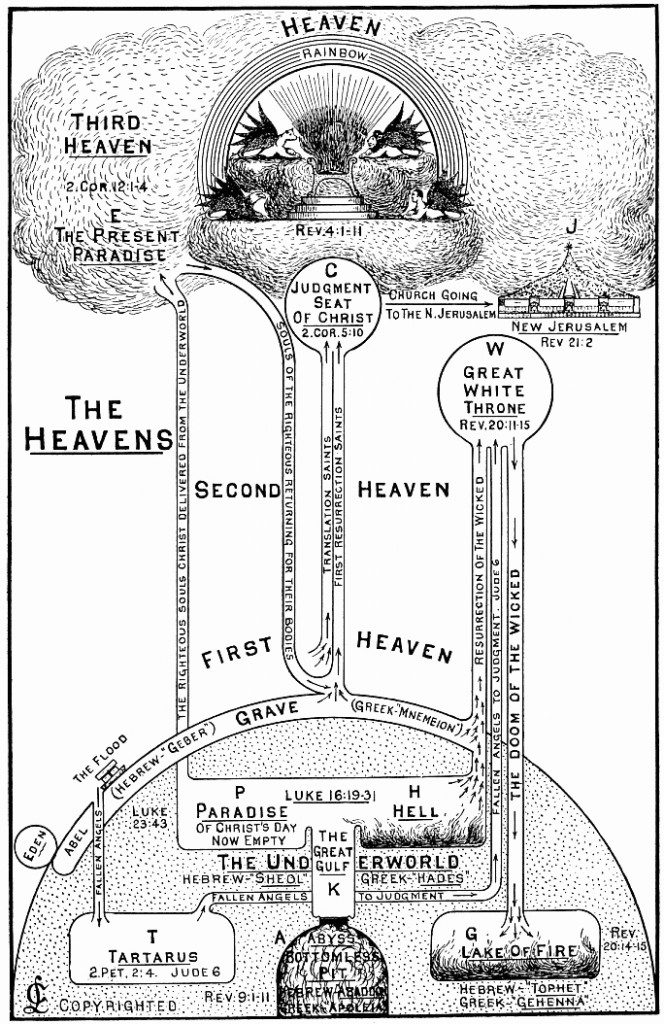From the Second Letter to the Corinthians:
I know a person in Christ who fourteen years ago was caught up to the third heaven — whether in the body or out of the body I do not know; God knows. And I know that such a person — whether in the body or out of the body I do not know; God knows — was caught up into Paradise and heard things that are not to be told, that no mortal is permitted to repeat.
(From the Daily Office Lectionary – 2 Corinthians 12:2-4 (NRSV) – June 13, 2013.)
 The third heaven? Secret unrepeatable knowledge? What sort of theology are we to create out this?
The third heaven? Secret unrepeatable knowledge? What sort of theology are we to create out this?
Maybe none. I don’t think theological development is what Paul is doing here. Instead, he’s just trying to bolster his bona fides. He’s bragged so much about himself in the first twelve chapters of Second Corinthians that the Greek epistolary conventions of his day required that he now switch to the third-person. He and his correspondents both know that he’s talking about himself, but hiding behind this third-person façade, he can do so without seeming to be too overbearing. (What? Paul overbearing? Never!)
I also know that he is appealing to a standard understanding of his day — authority based on visions and supernatural messages. Because Paul never knew Jesus in person, something about which he seemed to have something of an inferiority complex, he relies on this form of authority quite a bit, beginning with his dramatic conversion vision on the road to Damascus.
But come on! . . . The third heaven? . . . Things that are not to be told? . . . Things no mortal is permitted to repeat? This is the sort of stuff that drives some exegetes and preachers crazy, and others to develop outlandish theologies and cosmologies! What are we supposed to do with this stuff? Where, other than here (and maybe in some little-regarded apocryphal text like Third Enoch), does one find any mention of more than one heaven (or of layers or levels of heaven)? And what does it mean, anyway? Or, what is the point of bringing up something you’ve (excuse me, that nameless other guy you know) heard if it can’t be told or repeated?
That last bit gets Paul off the hook. He can claim (for that nameless other guy, wink, wink, nudge, nudge) the authority of a vision, but then doesn’t have to say what it was or what he learned in it because “no mortal is permitted to repeat” it. Nice rhetorical move, Paul!
Some evangelical exegetes assert that the Jews of Jesus’ and Paul’s time (and before) conceived of three heavens. The first heaven they identify with the atmosphere (the realm of the clouds and birds); the second, with outer space (where the sun, stars, and moon are); and the third, with the unseen dwelling place of God. There’s really no evidence of this in Scripture or in other writings. The Hebrew Scriptures frequently use the plural noun shamayim, i.e., “the heavens,” but Jewish cosmology developed no multi-leveled scheme until the Middle Ages. And then the mystics went whole hog (pardon the non-kosher metaphor) and elaborated a seven-layered view of the heavens.
So, although I don’t know what to do with this, I do know what not to do with this. It’s just Paul being Paul – arrogant, self-important, laying claim to authority by any means available, even a fanciful story of a trip through the cosmos. It shouldn’t be the basis of anyone’s theology!
====================
A request to my readers: I’m trying to build the readership of this blog and I’d very much appreciate your help in doing so. If you find something here that is of value, please share it with others. If you are on Facebook, “like” the posts on your page so others can see them. If you are following me on Twitter, please “retweet” the notices of these meditations. If you have a blog of your own, please include mine in your links (a favor I will gladly reciprocate). Many thanks!
====================
Father Funston is the rector of St. Paul’s Episcopal Church, Medina, Ohio.



Thank you! I know it’s now 2018, but I just found this post and I love it. I find some Christians’ deification of Paul to be frustrating and it’s good to read that not all priests are “impressed” by the apostle’s letters.
You’re welcome. Glad you enjoyed it!